#Hettie Macdonald
Note
hi, i love your webweaves so much ! if it's not too much trouble, could you please webweave something based on recovering from the hurtful actions of someone you used to love, and struggling with how to feel afterwards about that person and how they truly felt about you (whether they loved/cared for you or not) ? thank you so much !
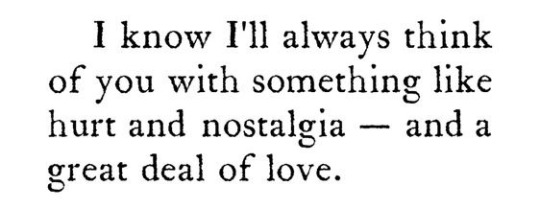
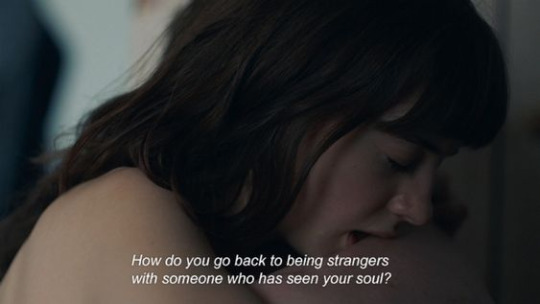

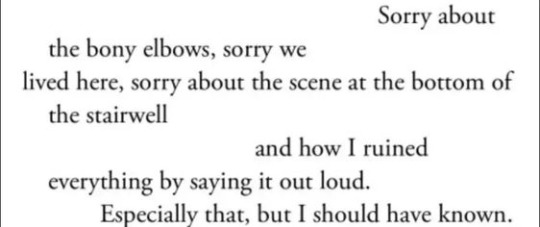

i hope you're doing okay <33
Sylvia Plath from a letter to Ann Davidow-Goodman written 1951 Letters of Sylvia Plath, Volume I: 1940-1956 / Normal People (2020) dir. Lenny Abrahamson & Hettie Macdonald / Anne Carson Autobiography of Red / Richard Siken Litany in Which Certain Things Are Crossed Out / Paramore Interlude: I'm Not Angry Anymore
#on loneliness#on heartbreak#on loss#web weave#web weaving#poetry compilation#poetry parallels#sylvia plath#ann davidow goodman#letters of sylvia plath#normal people#lenny abrahamson#hettie macdonald#anne carson#autobiography of red#richard siken#litany in which certain things are crossed out#paramore#i'm not angry anymore#poem#spilled poetry#spilled ink#dark academia#dark academia poetry#poetry#words#writing#dark academia quote#spilled thoughts#literature
711 notes
·
View notes
Text
9 Queer Movies from the 1990s You May Not Have Heard Of
It's New Years, which means it's time for lists. And while everyone else is doing 'top X of 2023,' I've decided to list 9 queer movies from the 1990s. Why? Because I wanna. Plus, in discussions of representation, I often see folks talk about it with a heavy focus on mainstream 'Hollywood' produced movies, which leads folks to talk as though progress has been linear. As if, in the past there was no/'bad' queer representation and now there is 'good' representation. But of course it's not that simple. Plenty of amazing queer movies were produced in the past decades...they were just indie movies and thus difficult to find in a world prior to Netflix and Mubi and whatnot. But now we have streaming services, so allow me to share some of my favorites from the before times (specifically the 1990s).
Without further ado....here is an alphabetical list of queer movies from the 90s you may not have heard of (especially if you're under 30).
--

Beautiful Thing (1996) (dir. Hettie Macdonald)
Before there was Heartstopper, there was Beautiful Thing. It's a story about two gay teens, one sporty and one very much not sporty...and about how they deal with pressure to come out and pressure to hide who they are. It's a very sweet coming of age story, really. However, unlike Heartstopper, in Beautiful Thing the economic class of the protagonists plays an important role in the story (the characters all live on a counsel estate in London). The characters stories are nearly as much about them being working class as it is about the two main character being gay. It's one of the first movies I ever saw about gay teens, and I loved it. I still get a wistful smile every time I hear Mama Cass Elliot's "Make Your Own Kind of Music." (cw for parental abuse)
--

Edward II (1991) (dir. Derek Jarman)
The real Edward II was King of England for 20 years in the 14th century. At the end of the 16th century, Christopher Marlowe wrote a play about Edward's reign and eventual downfall. In 1991, Derek Jarman streamlined Marlowe's play and brought all the homosexual subtext between Edward and Gaveston way out front. In the film, Edward II is in prison and reflects on the events which have led him to that point. The trouble begins when Edward takes the throne and brngs his exiled lover, Gaveston, back to England. All around them the rest of the aristocracy (including Edward's wife) conspire to bring Gaveston down. The movie itself is anachronistic (set in 1991), with minimal sets and costume, and staged a lot like a play. A lot of the dialogue is right out of Marlowe's play, though there are some changes to the story (notably at the end). It's honestly my favorite Derek Jarman movie, and frankly one of my favorite movies, full stop. (cw for blood, animal corpses, violent death)
--
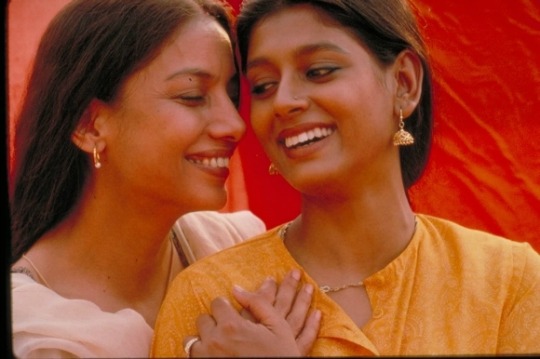
Fire (1996) (dir. Deepa Mehta)
Fire is the first film in the Elements Trilogy written and directed by Deepa Mehta. Each film in the trilogy is about different characters in India, with the connection between the three being thematic rather than plot or character. Fire is about two Indian women, Radha and Sita, who form a bond through their struggles living within a traditional "joint-family" (i.e. a family where all extended family live together and all money and resources are shared). The women in this family have very little agency and this film explores how the two main characters navigate through it. The men in this film are also repressed by the social structure in which they live, and this film spends some time looking at that as well. It's a film about queer desire between women living under patriarchy. (All the movies on this list are available on streaming services in the US, except Fire. However, I was able to find it uploaded to a random YouTube channel) (cw for someone catching on fire, brief domestic violence (a slap), and non-consensual kissing)
--
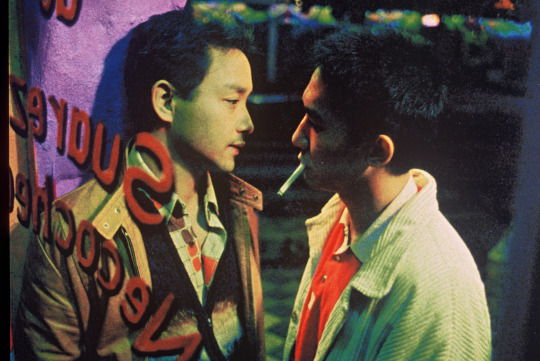
Happy Together (1997) (dir. Wong Kar-wai)
In Happy Together, two men from Hong Kong travel to Argentina and eventually get stuck there when they run out of money and are unable to return home. The relationship between these two men is very tumultuous, with a lot of arguing and breaking up and getting back together. It's one of the first movies I saw in which queer folks have, just, regular ol' relationship drama - exasperated by the regular ol' struggles of life. (i cant remember if there are any content warnings i should put here; it's been a few years since i've seen it)
--
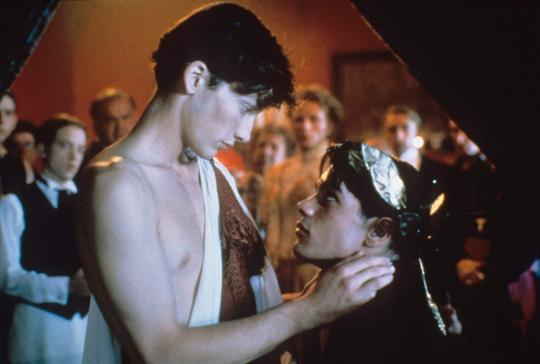
Lilies (1996) (dir. John Greyson)
Lilies is a Canadian film in which a prisoner requests a bishop come to the prison to hear the prisoner's last confession. It quickly becomes clear, however, that the prisoners have something else in mind when they begin staging a play. It turns out the bishop and prisoner knew each other as teens, and the play is about the events in their lives that led up to the prisoner being put on trial. So you end up with a play-within-a-play (or rather a play-within-a-movie). The film weaves between the production staged in the prison and the memory of the events in a really fluid way. All the prisoners portray their characters in the 'memory' sections, which lends itself to some really great moments in the prison sections. And at the heart of this memory/story is a queer love story. (cw for parental abuse, murder, fire, and suicide)
--

The Living End (1992) (dir. Gregg Araki)
This is a film about two young gay men who are diagnosed HIV positive. Unlike more mainstream films about HIV that came before (and after), The Living End wears its anger and pain on its sleeve. The entire world is entirely fucked up, and so these two men turn to a nihilistic outlook. The acting is just okay and some of the dialog is a bit ridiculous...but what draws me to rewatch this movie is the way that it conveys the emotion of the time. It's a ball of rage manifest on film. (cw for attempted suicide, rape, murder)
--
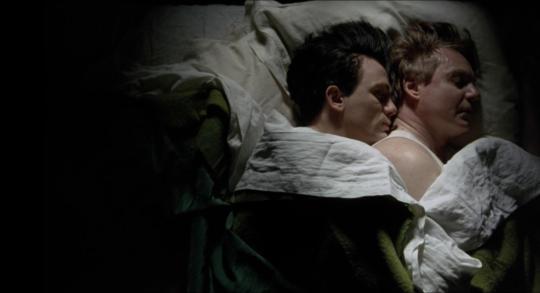
Love is the Devil (1998) (dir. John Maybury)
One of the problems with the average biopic is that it attempts to portray a person's entire life in a single movie. Thankfully, Love is the Devil doesn't have that problem; it focuses on only 8 years of Francis Bacon's life - the time he spent with a man named George Dyer. By this point, Bacon was already an extremely famous artist (and, at least in the film, a bit of an asshole). Bacon meets Dyer as Dyer attempts to burgle Bacon's studio - and thus begins an extremely dysfunctional love affair. If you want to see Derek Jacobi and Daniel Craig portray this dysfunctional relationship, then this is the movie for you. Also, if you want to see a biopic that lets the subject of the film be portrayed as a shitty person, this is a film for you. (cw for bdsm, drug use, untreated mental illness, and suicide)
--

Orlando (1992) (dir. Sally Potter)
From right out the gate, Orlando announces its queer themes by having Quentin Crisp portray Queen Elizabeth I, and Tilda Swinton portray Orlando (a man). From the first scenes it becomes clear that gender is going to be a main theme in the movie. Orlando is a young man who will never grow old and never die. He begins life in the 1500s, during Queen Elizabeth's reign, and we see him (and later, her) throughout the centuries between then and 'present' day (1992). The film is broken into thematic chunks (poetry, politics, society, etc). In each of these chunks we see Orlando's life as it reflects the social norms of the time (especially gender norms).
--
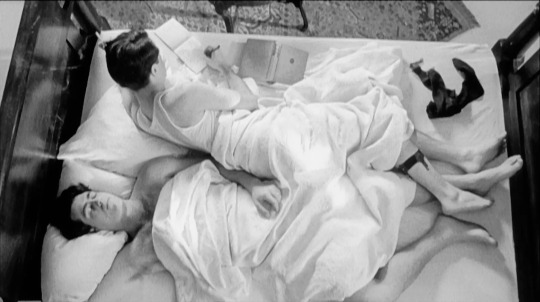
Swoon (1992) (dir. Tom Kalin)
Like Rope (1948) and Compulsion (1959), Swoon is a film about the Leopold and Loeb murder. Unlike the earlier films, Swoon makes the gay relationship between Leopold and Loeb explicit. Their relationship in the film is fairly uneven, with Loeb being characterized as more of an explicit manipulator. Leopold, on the other hand, is driven more by wanting to please Leopold. Complicating this dynamic is the way that Leopold is the one more interested in their sexual relationship. Is Loeb exchanging sex for help with his criminal activities? Or is Leopold committing crimes in order to elicit sex from Loeb? Or both...something a bit more complicated than either/or? The film, especially the latter half, eschews and lampoons the sensationalism of the reporting of the crime from the time. (cw for murder, blood (in black and white), and animal corpses)
--
Honorable mention goes to more well-known movies I didn't put on this list, such as: But I'm a Cheerleader, Velvet Goldmine, Bound, Adventures of Priscilla Queen of the Desert, The Birdcage, To Wong Foo, Thanks for Everything! Julie Newmar, My Own Private Idaho, Bent...there are actually a whole lot of queer movies from the 1990s, now that I think about it.
#beautiful thing#hettie macdonald#edward ii#derek jarman#fire#deepa mehta#happy together#wong kar wai#lilies#john greyson#the living end#gregg araki#love is the devil#john maybury#orlando#sally potter#swoon#tom kalin#virginia wolf#leopold and loeb#tilda swinton#quentin crisp#derek jacobi#daniel craig#francis bacon#lgbt movies#queer movies#lgbt representation#queer representation#1990s movies
43 notes
·
View notes
Text
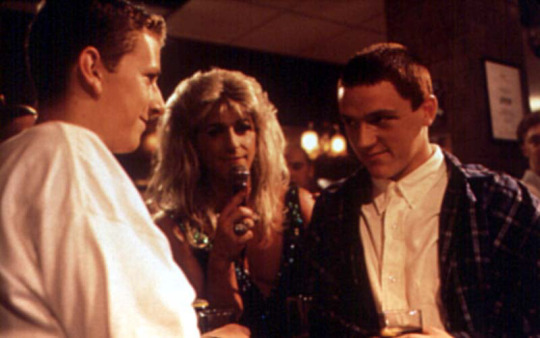

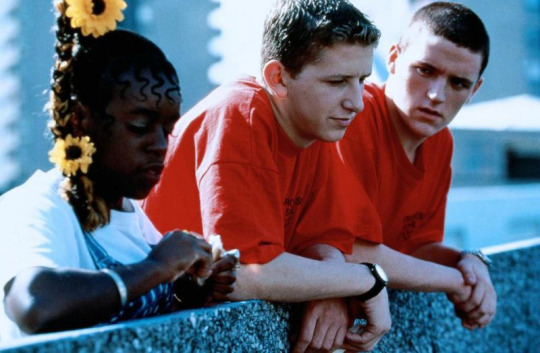

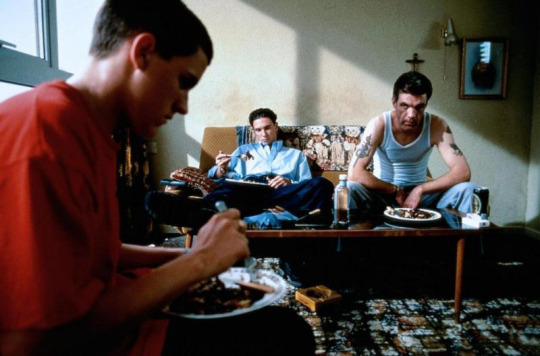


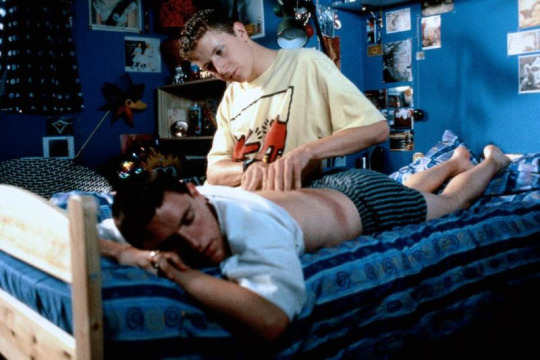


b e a u t i f u l t h i n g, 1996 🎬 dir. hettie macdonald
#gay cinema#gay movies#british cinema#beautiful thing#beautiful thing 1996#hettie macdonald#glen berry#Scott Neal#Jonathan Harvey#Linda Henry#Tameka Empson#celebrating diversity
54 notes
·
View notes
Photo
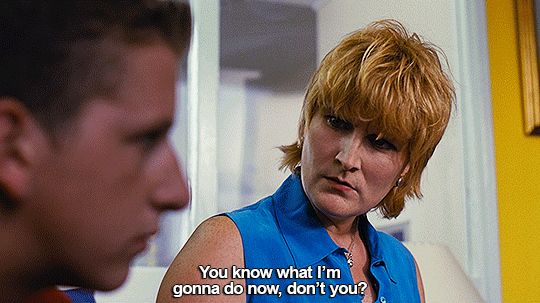
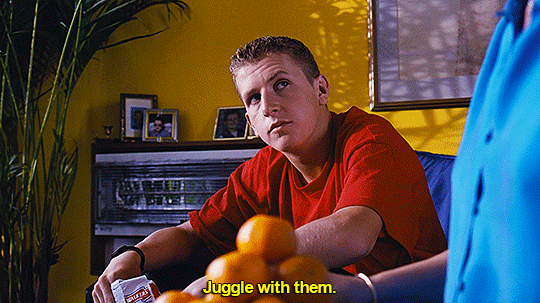
BEAUTIFUL THING (dir. Hettie Macdonald, 1996)
#beautiful thing#**#hettie macdonald#filmedit#filmgifs#cinemaedit#cinemagifs#dailyworldcinema#directed by women#cinematicsource
119 notes
·
View notes
Text
'...June 2007....there’s a near-10-year-old me that still gets scared at certain episodes of What's New, Scooby-Doo...
I’m more than happy to stick to comedies and cartoons, taking every measure imaginable to avoid the horrors of horror.
That is, until an episode of Doctor Who comes on the screen, featuring (or, rather, not really featuring) my Converse-wearing, pinstripe suit-donning idol in David Tennant’s 10th Time Lord, alongside Carey Mulligan’s Sally Sparrow, being hunted down by a group of angel statues out for blood.
That’s right, in the blink of an eye, Blink arrived - and so did my appreciation of what horror could do. (Or, at least, what it could do in a pre-watershed sci-fi series on the BBC - perfect for a fearful primary schooler like myself.)
Sure, this is no kill-heavy slasher in the form of Scream, and no paranormal mind-bender in the shape of The Conjuring, but Blink – perhaps the single most popular episode of the new Doctor Who era – demonstrates the genre’s ability to get under the skin and into the minds of the audience.
And, even with a PG rating and some questionable CGI, it does it masterfully well.
Blink’s greatest strength is its ability to establish a sense of creeping dread, of consistent threat, that is properly unnerving.
The feeling of being watched is one of the most disturbing one can experience, and has been explored throughout horror history - from Michael Myers taunting Laurie Strode from the shadows in 1978’s Halloween to Rory Kinnear’s birthday suit-wearing stalker drifting into the edge of the frame in last year’s Men, there’s very little that unsettles more than being followed.
There’s something mentally exhausting about the idea of never being able to rest, of not being able to drop your guard for even a moment, which can drive you insane - and Steven Moffat’s concrete-looking creations provide the perfect example of this.
You see, with the Weeping Angels, turning your back, trying to run away, or even taking your eye off their haunting expressions for a split second could spell the end of the road - just ask Amy Pond.
In the words of Tennant’s frantic Doctor, "Blink and you’re dead".
Is there any concept more terrifying than having the most basic human action rendered potentially life-threatening? This inescapable danger is draining, debilitating.
As we viewers watch Sally and Finlay Robertson’s Larry Nightingale navigate the nightmare they find themselves in, we grimace each time they turn their heads, and scream at the TV as we spot an angel moving ever closer.
It’s the sort of pulse-racing tension that only the horror genre can provide, and it lingers long in the memory.
Yet director Hettie Macdonald notches up the fear even further, ending the episode by turning her attention from Sally on the screen to us on the sofa at home, repeating Tennant’s iconic speech alongside real-life clips of gargoyles, statues and sculptures to ensure this isn’t just a concept that’s confined to the telly, but one that continues to stick with you even after you hit the big red button on the remote.
I know I, for one, lost many a night’s sleep in the weeks following that episode, as I feared that shutting my eyes to get some shut-eye would spell the end of my time on Earth (stop laughing, I said I was 10), and I’ll still remain resolute whenever I visit a cathedral or graveyard, determined to make sure those creepy creatures don’t get the drop on me. Thanks for that, Moffat.
As if the terror of being tailed from the shadows isn’t unnerving enough, though, the design of the Weeping Angels themselves ensures things are lifted to another level.
Visual effects producer Will Cohen and his team take something that is meant to be reassuring, gentle, holy, and turn it completely on its head.
As the angels switch from passive and peaceful to aggressive and menacing, their demonic faces take up the screen with a look of pure evil, accompanied by a smattering of thunder that still catches me off guard on the 18th watch.
Similar to clowns in the likes of It or dolls in the likes of Chucky, there’s an added shock factor that comes with witnessing something that’s traditionally 'good' going bad. Where once there was joy, there’s now malice, a threat - and if good can turn against you, what can’t?
All of this is hammered home by the fantastic leading performance from Mulligan. Through Sally, we see an everyday protagonist thrown directly into hell. We could easily be Sally ourselves, confused, overwhelmed and completely out of our depth, making it easy to properly experience these horrors through her.
Like the aforementioned Laurie in Halloween or Sidney Prescott in the Scream franchise, Sparrow is in no way prepared for her journey, an ordinary person in an extraordinary scenario, who’s unable to fully rely on a hero’s help - instead having to find her own way out of trouble.
And Mulligan delivers the twists and turns of this torturous 45 minutes with all of the nuance you’d expect from a future Oscar nominee.
Yet, what makes Blink truly special is that it delivers all of these thrills, scares and mental scars without the need for excessive blood splatters or easy cliches.
Through the simple combination of a killer script, top performances and a toe-curlingly terrifying concept, this beloved episode of Doctor Who provides everything horror has to offer, all without leaving the confines of a PG rating.
It may have come out 16 years ago now (yes, it is really that long ago), but Blink is still the ideal introduction to the genre - and a perfect Halloween watch, if you’re too scared to see Saw.'
#Doctor Who#Blink#David Tennant#Weeping Angels#Sally Sparrow#Carey Mullihan#Steven Moffat#Finlay Robertson#Hettie Macdonald#Will Cohen#Amy Pond
13 notes
·
View notes
Text
Normal People (2020)
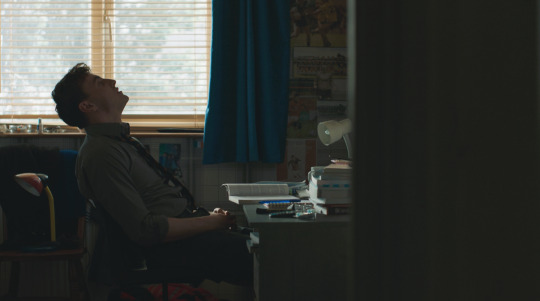

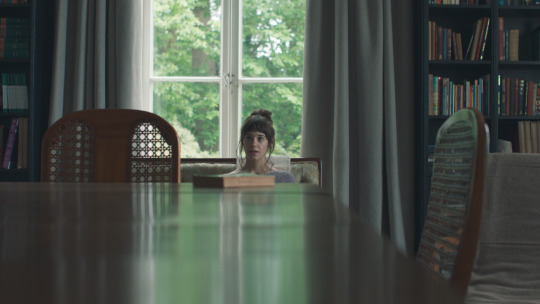
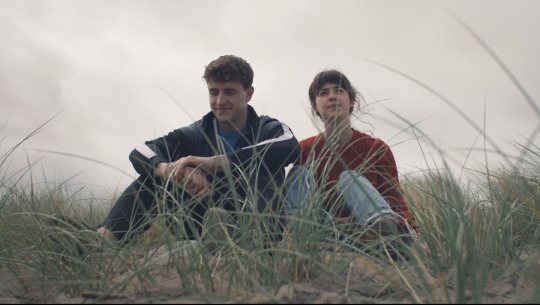


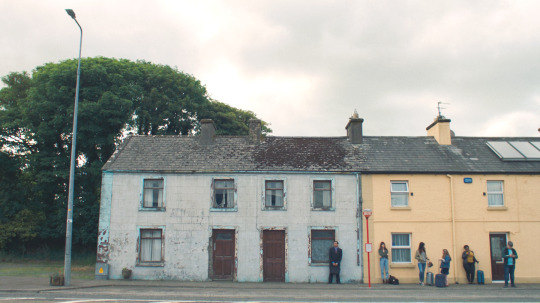
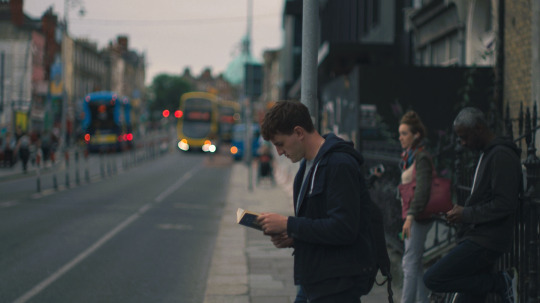


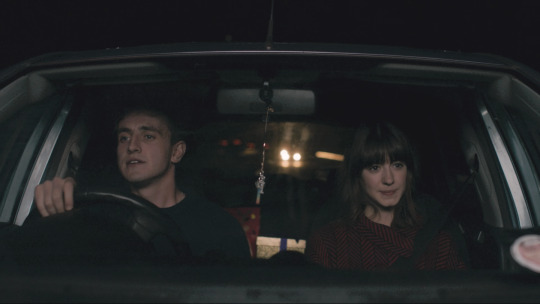

#normal people#lenny abrahamson#hettie macdonald#paul mescal#daisy edgar jones#connell x marianne#hulu#tv series#screenshots#caps#Daisy Edgar-Jones
14 notes
·
View notes
Text
“HOWARDS END” (2017) Review
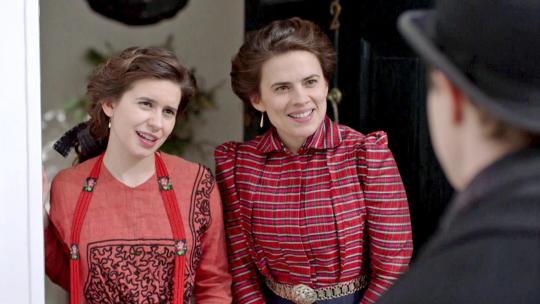
"HOWARDS END" (2017) Review
If there is one production company associated with the works of E.M. Forster it is Merchant-Ivory, the creation of producer Ishmail Merchant and director-producer James Ivory. I find this odd, considering that Merchant-Ivory have only adapted three of Forster's novels. One of those novels is "Howards End", published in 1910. There have been at least three on-screen adaptations of the latter - a 1970 BBC movie, Merchant-Ivory's 1992 Oscar winning film and the ITV's 2017 miniseries. This particular article happens to be about the latter.
"HOWARDS END" is basically an exploration of social and class divisions in Edwardian Great Britain, through the viewpoints of three families - the intellectual and idealistic Schlegels, the Wilcoxes; who are wealthy capitalists; and the working-class Basts. Sisters Margaret and Helen Schlegel become acquainted with the Wilcox family during a trip to Germany. When Helen, the younger Schlegel sister, visits the Wilcoxes at their country house, Howards End. She becomes attracted to the younger Wilcox son, Paul, and they become engaged in haste. However, the pair soon regret their decision and quickly break off their engagement. but soon regret their decision, breaking off the engagement by mutual consent. Months later, the two sisters and their younger brother Theobald "Tibby" Schlegel attend a musical concert, when Helen accidentally takes an umbrella that belongs to the impoverished clerk Leonard Bast. He appears at the Schlegels' home to retrieve it but leaves in a hurried after becoming embarrassed by his umbrella's shabby quality and appearance. Several months more pass before Leonard's common-law wife, Jacky, appear at their home, demanding his whereabouts. Apparently, Leonard had embarked upon a long walk into the countryside upon leaving work. He returns to the Schlegels' home to explain his disappearance and quickly forms a friendship with the two sisters.
Meanwhile, the Schlegels renew their acquaintance with the Wilcoxes when the latter move into a London townhouse, across the street from the latter, for oldest son Charles' wedding to a young woman named Dolly. With Helen visiting relatives in Germany, Margaret begins a friendship with Mrs. Ruth Wilcox. But their friendship is cut short by the latter's death. Sometime after Ruth Wilcox's funeral, the Schlegels become acquainted with the Wilcoxes again when Margaret and Helen encounter the recently widowed Henry Wilcox around the same time their friendship with Leonard Bast begins. Between Henry's bad employment advice regarding Leonard, Helen's developing dislike of Henry, and Margaret's growing attraction toward the businessman; a clash between social and political classes spiral toward a startling conclusion.
I had first learned about this third adaptation of Forster's novel through a blog that centered around period movie and television productions. The writer, a major fan of the 1992 adaptation, had quickly dismissed this production (without having seen it, I may add) as not worth viewing. Considering my past experience viewing the 2007 television adaptation of "A Room with a View", I had felt inclined to follow the blogger's advice. But in the end, I had decided it would have been fairer to give "HOWARDS END" a chance. I am more than glad I did.
Mind you, I had a few quibbles about "HOWARDS END". If I must be honest, I can only think of three quibbles right now. The miniseries featured a scene I believe should have involved a bit more of an emotional impact. This scene featured Margaret Schlegel's response to Henry Wilcox's decision to end their engagement, following the revelation of his past affair with Jacky Bast. I can see Margaret keeping her cool, while facing Henry's emotional decision. But even in the privacy of her room, Margaret had remained calm, almost cold, as he contemplated her next move. I do wish that director Hettie MacDonald and screenwriter Kenneth Lonergan had allowed a small peek into any emotional turmoil on Margaret's part. I also found her reaction to seeing Henry again, at his daughter Evie's wedding, a bit odd. She seemed a bit too . . . controlled, even after Helen had led her and Leonard away. Speaking of Jacky, I consider my third quibble to be a major narrative problem. And it is a problem shared by Forster's original novel and the 1992 film. What in the hell happened to Jacky Bast? Neither this miniseries, the novel or the movie bothered to reveal or hint Jacky Bast's fate, following that final event at the Howards End estate. It seemed clear that once poor Jacky had served her purpose in exposing Henry's past, Foster did not give her another thought. Screenwriter Ruth Prawer Jhabvala had decided to be faithful to the novel in her screenplay for the 1992 movie. I had hoped Lonergan would resolve this issue in miniseries' screenplay. Unfortunately, he had merely repeated Forster's mistake.
Despite my issues, I really enjoyed "HOWARDS END". Much more than I had fully expected. Thanks to Hettie MacDonald's direction and Kenneth Lonergan's screenplay, I thought the miniseries did an excellent job in exploring the different social classes and political beliefs that permeated the story. I do not know if I would label the Wilcoxes as part of "the upper classes". Before World War II, only members of the aristocracy and landed gentry were regarded as the upper classes. The Wilcoxes are obviously rich capitalists, whose fortune had originated in one or many of the British colonies overseas. Before the war, they would be regarded as "trade", regardless of their wealth. I sometimes found myself wondering if Henry Wilcox's attempt to find a family estate of his own was indicative of his desire for the family to be regarded a lot higher than mere rich capitalists. After all, his first wife Ruth, whose family had owned Howard End for generation, may have come from the landed gentry. Henry and his children did not seem interested in living at Howards End. Yet, they seemed determined that Ruth's desire to pass the estate to Margaret would be prevented. I find it strange that none of this had ever occurred to me, while watching Merchant-Ivory's film or reading Forster's novel.
Then again, I should not have been surprised. Watching this miniseries had made me aware of a lot of issues and emotions in the story - more so than the film and novel ever did. In at least two scenes, the miniseries seemed to have further exposed Henry's bullying and hypocritical nature. This was apparent in one scene in which he dismissed some of Helen's progressive views in a friendly, yet arrogant manner during her stay at Howards End in the first episode. Another scene featured Henry's refusal to consider that his advice regarding Leonard's employment had left the latter jobless. I found his reaction to Leonard's situation so arrogant and insensitive that I had to fight the urge to punch my fist through the television screen. I also noticed in some of the scenes featuring Ruth Wilcox that despite her gentle and soft-spoken nature, she seemed to exercise a strong grip on her family - including Henry. One very interesting scene in this miniseries featured Margaret and Helen's discussion about the Wilcoxes and the latter's negative comments on the wealthy family. Also, this version of Leonard Bast seemed not only more timid, but also more insecure.
What I found surprising about this adaptation is the less-than-ideal portrayal of the Schlegel sisters. Mind you, MacDonald and Lonergan's portrayal of "Tibby" Schlegel did not hesitate to expose the character's sharp wit, arrogance and self-absorbed nature. One brutal moment featured Tibby refusing to speak to Leonard, when the latter appeared at the Schlegels' current home to learn Helen's whereabouts. And as shown in the 1992 adaptation, the pair also exposed Helen's over-emotional reaction to the Wilcoxes and Margaret's relationship with Henry, along with Margaret's willingness to throw the Basts under the bus, when their very presence (I should say Jacky Bast's presence) proved to be a major inconvenience to her engagement. But I was surprised by MacDonald and Lonergan's willingness to expose Margaret's shallow fascination of Henry Wilcox's "manly" traits and his wealth - something I suspect that may have led her to consider him as a potential husband. Another moment that caught me by surprise was Helen's disregard for Jacky Bast and the dismissive comments she had made about the latter. She only seemed interested in Leonard, who somewhat shared her family's intellectual pursuits.
Just about every performance featured in "HOWARDS END" struck me as first-rate. I could not think of one misstep within the cast - at least as performances were concerned. Mind you, I thought casting Matthew MacFadyen and Julia Ormond as Henry and Ruth Wilcox was a bit problematic. Especially since Ormond is nearly a decade older than MacFadyen. But I cannot deny that both gave excellent performances. Ormond did a great job in portraying a soft-spoken and graceful woman who was not only in a state of physical decline, but also managed to exact a strong will over her family. I was really surprised by MacFadyen's portrayal of Henry Wilcox, but I thought he gave a fabulous performance as the domineering, yet short-sighted businessman who reeked of toxic masculinity. Although his appearance in the miniseries was brief, I thought Jonah Hauer-King gave a solid portrayal of the younger Wilcox son, Paul. Bessie Carter and Yolanda Kettle struck me as equally solid as Henry's only daughter, Evie Wilcox and Charles' bride and later wife, Dolly Wilcox. But I was very impressed by Joe Bannister's portrayal of elder son Charles Wilcox. I thought he did an excellent job of conveying the character's conservative and brutish nature without any taint of cartoonish acting.
Alex Lawther gave an excellent performance as the eccentric and self-absorbed Tibby Schlegel. Why do people assume that performers known for comedy would have such difficulty in dealing with dramatic roles? I never understood this attitude, considering comedy is known for being more difficult to perform. Tracy Ullman, who portrayed the Schlegels' Aunt Juley Mund had no difficulty in seamlessly utilizing both comedy and drama in her first-rate portrayal of the meddling, conventional, yet well-meaning woman. I thought Rosalind Eleazar gave an exceptional performance as Jacky Bast, a former prostitute who also happened to be Leonard's ill-fated woman. Eleazar managed to infuse a sense of desperation in Jacky, who struggled unsuccessfully to keep her and Leonard from falling into some kind of social and economic abyss.
It seemed good to see Hayley Atwell in a properly dramatic role, after spending years appearing in the Marvel Cinematic Universe films and television shows. I thought she gave a first-rate portrayal as Margaret Schlegel, the warm and strong-will sibling of the Schlegel family. Atwell did an excellent job of conveying Margaret's most admirable traits and at the same time, exposing the character's more questionable ones with great subtlety. I especially admire her performance in one scene in which she tried to force Henry to face his hypocritical refusal to forgive Helen's state as an unmarried mother, in comparison to his adulterous past with Jacky Bast. Joseph Quinn recently made a name for himself as an eccentric high school student during Season Four of the Netflix series, "STRANGER THINGS". But I was more than impressed by his portrayal of the intellectual wannabe, Leonard Bast, who found himself befriending the Schlegel sisters. Quinn did a great job in not only portraying Leonard's intelligence and longing for intellectual pursuits, but also his growing insecurities as he found his life being drawn even closer to the Schlegels and the Wilcoxes. But if I had to vote for the best performance in "HOWARDS END", I would select Australian actress, Philippa Coulthard. I thought she gave a superb performance as the younger Schlegel sister, Helen. I really admired how Coulthard conveyed Helen's emotional journey throughout the story; especially in scenes that featured Helen's scathing commentary on the Wilcox family, her growing hostility toward Margaret's romance with Henry Wilcox, her complicated relationship with Leonard and especially her anger at the Basts' destitute situation in the wake of Henry's poor employment advice.
One aspect of "HOWARDS END" that really took me by surprise was the excellent qualities of the miniseries' production values. Mind you, Sheena Napier's costume designs never attracted the same kind of acclaim that those from the 1992 movie. If I must be honest, I actually enjoyed her designs (as shown below):
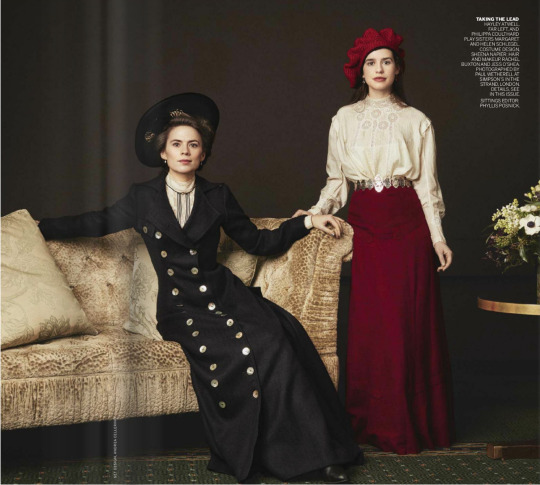
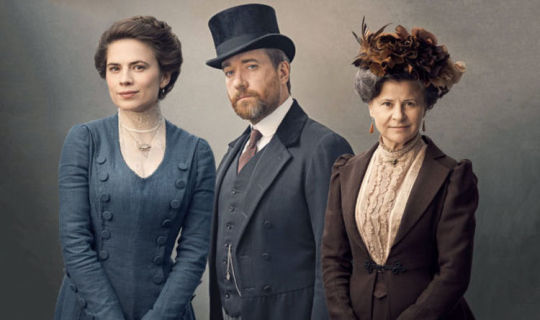
I found them quite colorful and beautiful without being too stylized or glamourous. Considering the characters viewers are dealing with, that seemed sufficient to me. I also enjoyed Wojciech Szepel's beautiful photography, especially in locations in London, Dorset and Buckinghamshire. But what really blew my mind were Luke Hull's production designs. I thought he did a superb job in re-creating Edwardian England, especially those scenes shot and set in London. While watching the miniseries, I felt as if someone had dropped me squarely back into London circa 1905-1906.
"HOWARDS END" managed to score a good number of award nominations, but I noticed that most of them came from lesser award organizations. It did win the BAFTA Award for Best Miniseries, but that was about it. No other nominations from BAFTA, no nominations from the Golden Globes or the Emmys. And all I can say is . . . "what the hell?" "HOWARDS END" proved to be one of the best television limited series I have seen in years. It became a critical darling from the media. Yet, it did not earn or win any major nominations, aside from the BAFTA Best Miniseries award? Were people so busy comparing it to the 1992 Merchant-Ivory film that they were blinded by its own merits? Hell, I believe it is just as good as the 90s film in its own way. I thought Hettie MacDonald, screenwriter Kenneth Lonergan had created an exceptionally first-rate miniseries that featured superb performances from a cast led by Hayley Atwell, Matthew MacFadyen and Philippa Coulthard. Perhaps one day, many other than the media, will appreciate it on its own merits.
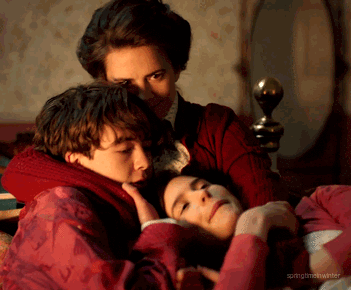
#e.m. forster#howards end#howards end 2017#hettie macdonald#kenneth lonergan#schlegel family#wilcox family#bast family#hayley atwell#matthew macfadyen#philippa coulthard#joseph quinn#tracey ullman#rosalind eleazar#alex lawther#joe bannister#bessie carter#jonah hauer king#julia ormond#bafta award#yolanda kettle#bbc costume drama#costume drama#period piece#period drama
16 notes
·
View notes
Text
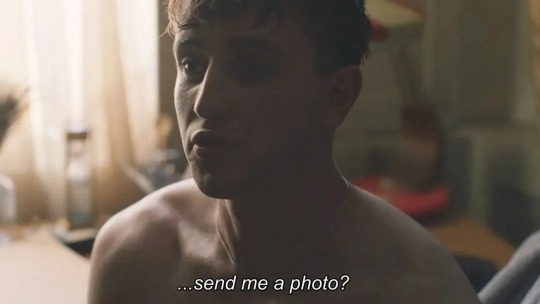
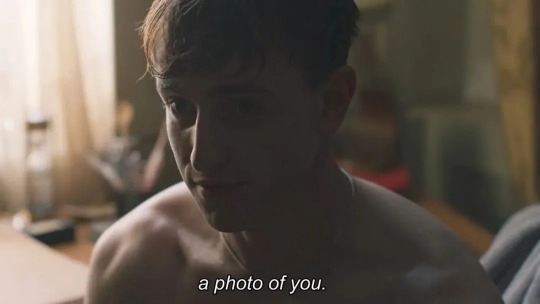



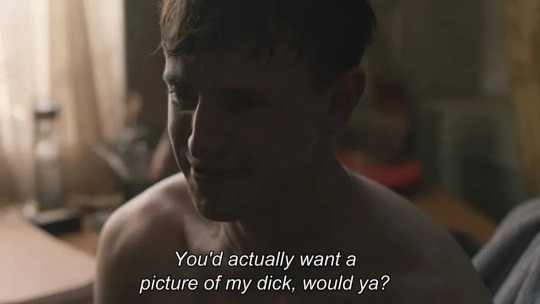
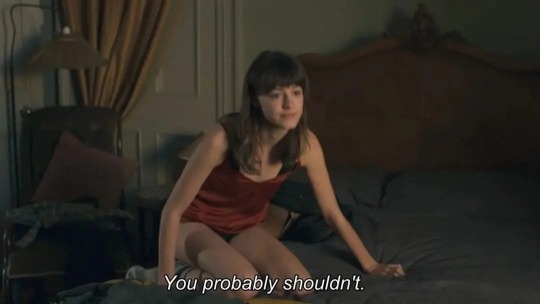
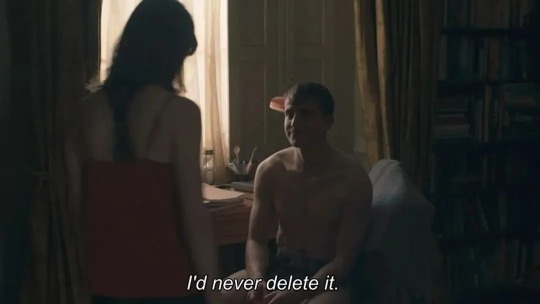
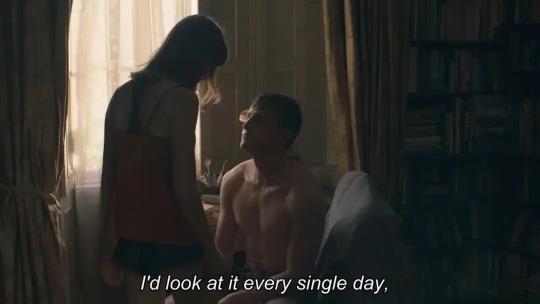

Normal People, Lenny Abrahamson & Hettie Macdonald , 2020
Aw... No one sends me dick pics anymore... Ahahah!
7 notes
·
View notes
Text
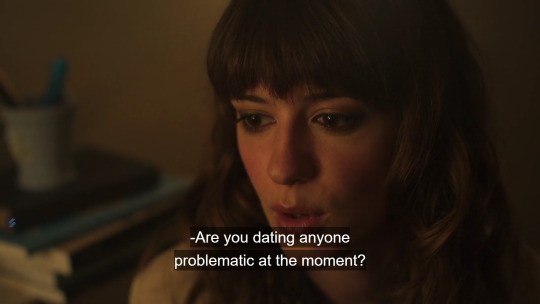
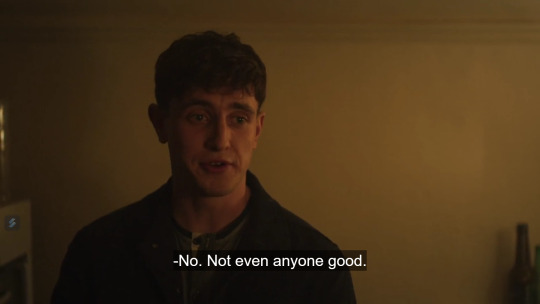
Normal conversations with normal people
Normal People (2020)
5 notes
·
View notes
Photo

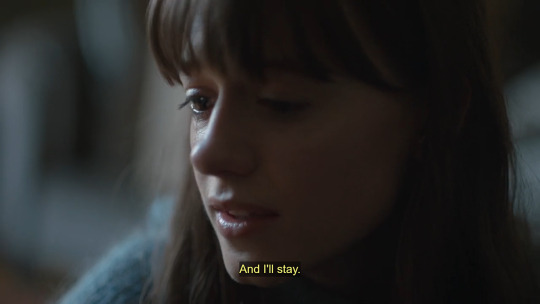
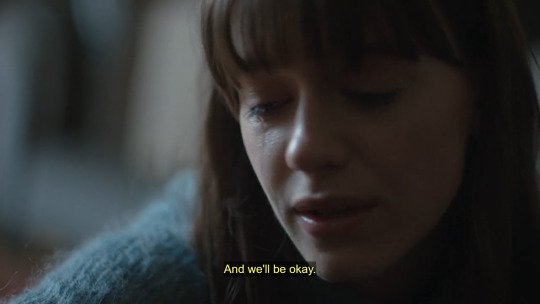
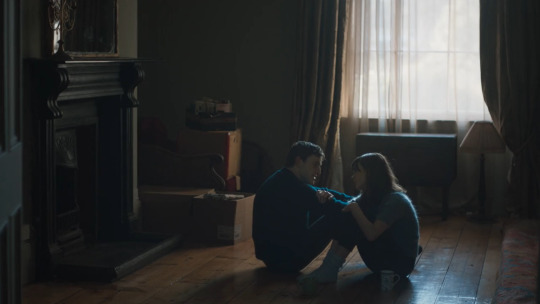
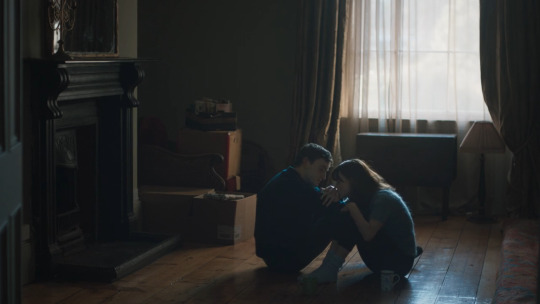
Normal People (2020);
dir. Lenny Abrahamson, Hettie Macdonald
#normal people#sally rooney#mini series#lenny abrahamson#hettie macdonald#normal people series#normal people mini series
12 notes
·
View notes
Photo
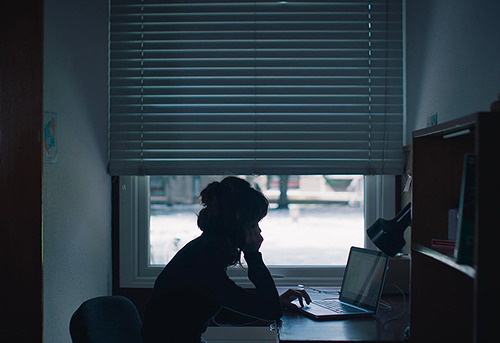
Normal People (2020): 1x09 dir. Hettie Macdonald
#normal people#hettie macdonald#sally rooney#daisy edgar-jones#daisy edgar jones#marianne sheridan#tv#tv show#tv shows#tv series#series#mini series#miniseries#hulu#cinema#cinematography#screencap#screencaps
47 notes
·
View notes
Text

I realized I have no more Heartstopper to consume in any format, so I thought of going old school for tonight's shot of homosexual serotonin and revisited one of my all time favorites, the OG Heartstopper.
Beautiful Thing. Utter perfection in movie form. These last few years I often went back to the filmed version of the stage play, because I love the actors, and hadn't rewatched the movie in a while. I'm so glad I decided to do just that tonight.
This is the movie that defined my gay adolescence. This is the movie that made me realize that I was not wrong and that there was a light at the end of the homophobic tunnel known as the early 1990s. And maybe it's because I was a kid back then, but everything still feels incredibly fresh and relevant, even though it's been so many years.
I can't even put into proper words the raw emotions that this movie makes me feel. It's not only the gay romance. It's the complexity of everything that is put out there by playwright/screenwriter Jonathan Harvey: mother/son relationship, the observations on class and privilege, the tough talk about abuse and neglect, the heartbreaking glimpses into social paralysis and so much more, with everything still presented in a way that is beautifully hopeful, truthful and empathetic.
I love this movie so so much.
Thank you director Hettie Macdonald. Thank you Jonathan Harvey. And a huge thank you to that wonderful cast, starting with the fierce matriarch that was Linda Henry and the two lovely boys that made me fall in love with loving boys: Glen Berry and Scott Neal.
#beautiful thing#heartstopper#jonathan harvey#linda henry#scott neal#glen berry#hettie macdonald#lgbtq movies
2 notes
·
View notes
Text

61. Beautiful Thing (Hettie Macdonald, 1996)
Oscillates wildly between cloying cliché and truly resonant moments of male intimacy and familial acceptance. Linda Henry Chlotrudis nomination EARNED!
Rating: 7.5/10
4 notes
·
View notes
Text
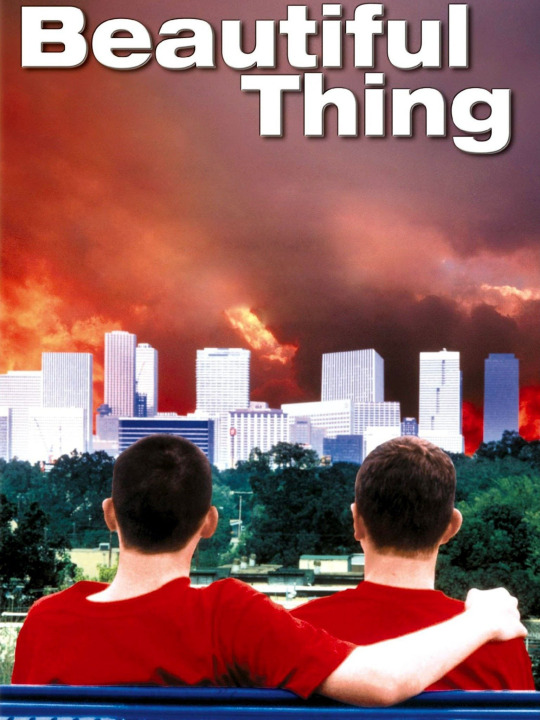
b e a u t i f u l t h i n g, 1996 🎬 dir. hettie macdonald
#gay cinema#gay movies#british cinema#beautiful thing#beautiful thing 1996#hettie macdonald#great film posters#great movie posters#film poster#movie poster
6 notes
·
View notes
Text

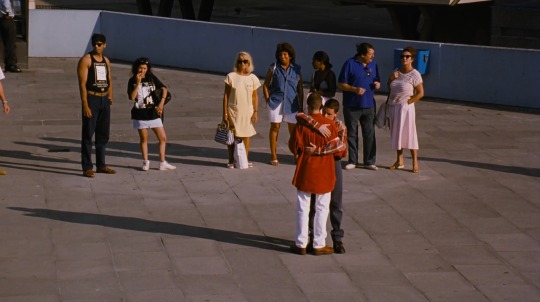


1 note
·
View note
Text
'Time isn't a physical thing yet writer/director Andrew Haigh somehow weaves the mercurial essence of it into every single frame that makes up his fifth feature, All of Us Strangers (sixth if you count Looking: The Movie). In doing so, Haigh imbues the film with an ethereal quality that's just a step or two outside of our so-called objective reality.
But actually, that's what life can often be like as a queer person. In childhood, other kids often know you're different before you do, as if they've glimpsed your future first-hand, and for those who suppress their queerness growing up, it often takes years longer to come into your own.
Even then, once you've finally found some degree of healing, past traumas can pull you back in time just like that, transforming you once again into a younger, damaged version of yourself. (It doesn't help that coming out is a lifelong process, as if you're stuck in a not-so-funny '80s time-loop movie.)
In All of Us Strangers, a gay forty-something man named Adam is literally pulled back to these traumas when he meets his dead parents as they were, all those years ago before an accident took them away.
In coming out to these time-displaced figures – who both bring with them the baggage of AIDS-fuelled '80s hysteria – Andrew Scott's character almost becomes a child himself again, and in Haigh's real childhood home, no less.
Through adapting Taichi Yamada's novel Strangers (a book that's also a product of the '80s), Haigh bridges the gap between not just his past self and the present, but also two different eras of gay men through the intergenerational love story that unfolds between Adam and Harry (Paul Mescal), a younger man who accompanies him on this journey of healing.
Digital Spy caught up with Andrew Haigh to discuss coming-out scenes of a very different kind and the importance of crafting "a love letter to queer people of a certain generation". Along the way, we also talked the hidden significance of that sex scene and why casting Jamie Bell and Claire Foy was such a gamble.
All of Us Strangers plays so much with time – like most of your work does – and that feels intrinsically queer to me. As queer people, we don't always follow a traditional timeline, so I wondered if you could share how the film's shifting of time relates to the queerness that's integral to this story?
It's so interesting, because I feel like as a queer person, time is somehow different. As you say, your life seems to go on a different trajectory, and you don't have the sort of markers that other people have, although that is changing. I do think for younger queer people, it is a slightly different experience.
So I think it's just inherent in me as a person that I see time slightly differently, which is why it's always so interesting for me to play around with the idea of time.
All of my films, whether it's been Weekend, which is an obsession with 48 hours of someone's life, or 45 Years where something from the past has come back and disrupted the present, it just... I'm just so interested in the nature of time.
Casting Jamie Bell and Claire Foy as Andrew Scott's parents, even though they're actually younger than him, is such an interesting idea to play around with, both visually and emotionally. But were you ever apprehensive or worried that this approach might fall short or not work in the way you hoped it would?
Yeah, I was really worried about it [laughs]. I thought if that doesn't work, the film is terrible. People might laugh at it and be like, "This is just so stupid". The film works on an emotional level and I need that to be believable and real.
But then, weirdly, the minute I started filming with them, my fears went away, because I could see that it was working in the moment. And I could see that it was working emotionally.
Jamie and Claire do an incredible job at feeling like they are Andrew's parents. And he does feel like he is their child. So the nature of how they look sort of becomes irrelevant. Then I thought a lot about how, of course, that makes sense.
If we think about our parents in our minds, we don't necessarily think about what they look like now, if they're still around. We think about how they used to be. It's the same with anybody in our lives. You can think of a friend that you may not have been in contact with for 20-30 years. In your mind, they're exactly like they were back then. I think that is just the nature of our memory and how that works, so it does make sense for the film.
That moment when Adam gets into bed with his parents could have been particularly hard to pull off, but it works so beautifully within the context of the narrative.
I mean it could be ridiculous. He's wearing pyjamas that don't fit, and he's trying to get into bed with his parents. It could be absolutely ridiculous. But I think it speaks to this idea... Think about those pyjamas.
We all understand the desire to want to go back and feel that comfort sometimes that we felt as a child, but of course, it doesn't fit anymore. They're too tight and he isn't a child. He is an adult. But within all of us, we still have that element of being a child within our adult bodies, not just as children but our parents are the same. Everybody is the same. The child is always trapped within us.
That element really comes to the fore in the film's two coming out scenes when Adam reveals himself to parents who are technically younger than him. We've seen so many coming out stories over the years, but we've never seen anything like this before. Why do you think these two scenes have resonated in particular with so many fans of the film?
I mean, there's a number of things. People are always like, "Oh, we don't need more coming-out scenes. We've done all the coming-out scenes," but I think a lot of us, as queer people and gay people, are still affected by that, that feeling of having to come out and how terrifying, how horrendous that was for so many of us and the fear of having to say something to our parents, and they may reject us for that.
It was a very, very traumatic event for lots and lots of people, especially back in the '80s.
What this is about, in many ways, it's not just that he's coming out to his parents, but he's being reminded of how he used to feel back then. Because the parents reaction is how everybody felt about gay people back in the '80s. Or how most people felt. That was a very difficult time.
I wanted it to be sort of generous as well, even to the parents, because they lived in a period of time where they were just fed stories and lies, essentially, and fears about gay people. So I didn't want to vilify the parents either because that's the culture they lived in at the time.
It's so rare still to see the experiences of gay men Adam's age explored like this. Why would you say it's important that the stories of gay men who lived through the AIDS crisis continued to be centred this way on screen?
I think it's a really important generation for me as a queer storyteller. I wanted to say something about that generation, and it is a very specific generation. It is a generation of people who grew up as AIDS was decimating communities.
As young queer people in that time, we grew up surrounded by the idea that our sexuality was completely linked to death. I think it's very easy to forget how traumatic and horrendous that was, and that we are still living with the ramifications of that and the shame that went along with that.
The way that people treated us made us feel ashamed. It's not that we were inherently shameful because we were gay, but we were made to feel shamed. That has been a struggle that a lot of us have had to work through into our 40s and 50s and people into their 60s are still dealing with that, so I think it's a really important thing.
And also just to remind people that yes the world has changed, thank God, and everyone seems to have forgotten what it was like back then, but we haven't forgotten, even on an unconscious level. We can remember.
I always wanted it to be a love letter to queer people of a certain generation to say, "You know what? I know that it's still painful to think back at that time, and it is still painful. And I want us to realise that it's still painful and it's okay to to appreciate that sometimes."
I was born in the mid '80s, so I wasn't an adult during the height of the AIDS crisis, but I absolutely felt the ramifications of it still into the '90s and beyond, this idea that being gay is instantly connected to fear and death.
Yeah, the '90s wasn't a Golden Age either. Even into the late '90s, I remember there were debates going on in the House of Commons where people would still be saying that what we were doing was sinful and wrong and that we were gonna go to hell.
This is in the '90s. This is not the 1970s or 1980s. So I think that living in the '80s and '90s was not an easy time for queer people, definitely.
That sex scene early on where Harry licks cum off Adam's chest really struck me, because any kind of contact with bodily fluids like this would have once been horrifying to Adam. Did you consciously include this scene in relation to Adam's shame and him overcoming it?
Absolutely. That's the point of that shot to me. I think there's probably lots and lots of people who will not truly understand that at all. Of course, you will understand it because you understand it from a personal standpoint.
There are two gay people of a different generation and one has no fear in that moment of what he's doing. The other one is still resistant to that. That's years of something within his body telling him to be resistant. And he overcomes it because of course, you can overcome it. Lots of people do overcome that fear and shame and that is the point.
In that moment, there was a little bit of resistance, but the intimacy and the compassion of Harry in that moment allows him to overcome a sort of embedded fear.
Some people see the ending as very uplifting and hopeful while others find it sad. Obviously, tragic endings are embedded in the history of queer cinema, so did you feel pressure to try and avoid tropes like 'Bury Your Gays'?
I understand there was that trope. It's often the trope actually gets said more than the reality of that being an actual reality. It's like "Oh, you're gonna kill off all the gays" but actually, that's not always what happens.
There is a way in which this film could have ended on a very optimistic, joyful note. To me, that would have been a little bit simplistic in terms of what the story is trying to unpick and understand, which is about the actual nature, the essence of love, and what is important within that.
I also think that sometimes when you're telling queer stories, I want to dig a little bit deeper into the pain, into the reality of things. There you can get closer to the truth and I think that is important.
Let's go back to the '80s. A lot of people, a lot of gay, queer people, lost their partners young and lost a lot of people that were very, very important to them. But as that also happened, what I found so profoundly beautiful is, it sort of highlighted the idea of love in itself as being some kind of saviour and that it can save you and the importance of that love. After all, loss is still so fundamentally important.
Looking back, is there a particular example of queer TV or film that really resonated with a younger version of yourself?
It's a tricky one. I feel like in the end, it was probably watching Beautiful Thing, that Hettie Macdonald film.
I remember I was working in a cinema, the National Film Theatre, and it was the gay and lesbian film festival, I think, or it was a special screening of Beautiful Thing. There is a gay film, actually, that's very, very joyous. It's got so much joy in it. It ends on a really uplifting, joyful note.
I just remember sitting at the back as an usher, seeing that film, and I wasn't even out at that point. I was still in the closet. And I remember feeling like, "Ah, okay, there's a possibility out there for me". I remember loving that moment. It was both emotional and cathartic and joyous.
I still love that film. I watch that film now when they're running through the woods and The Mamas and the Papas are playing and they kiss against the tree. It's so beautiful. I adore it. So even though my films don't often end on moments of pure joy, I still like moments of pure joy [laughs].'
#Andrew Haigh#All of Us Strangers#Claire Foy#Jamie Bell#Andrew Scott#Paul Mescal#Hettie Macdonald#Beautiful Thing#Strangers#Taichi Yamada#The Mamas and the Papas#Weekend#45 Years
4 notes
·
View notes